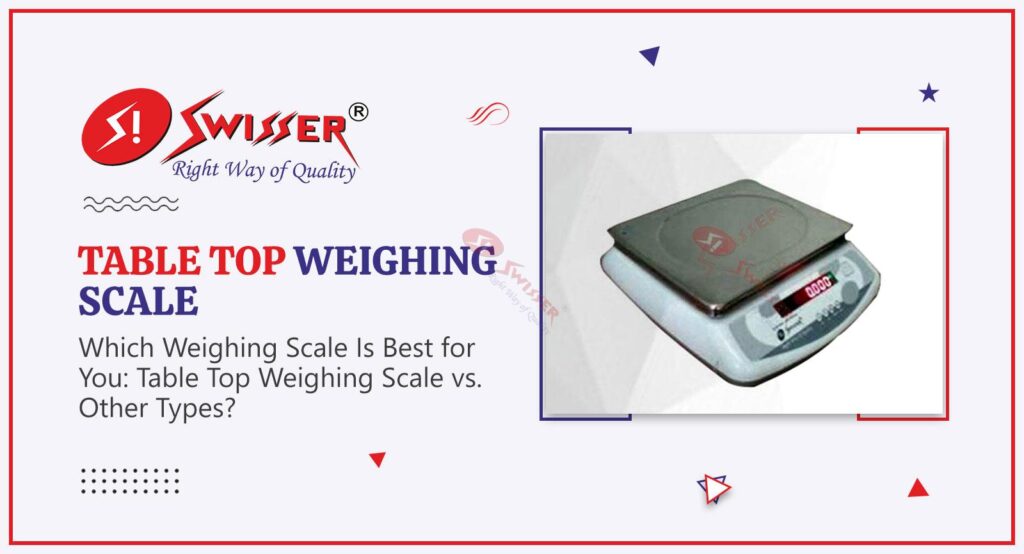HomeBlogTable Top Weighing ScaleWhich Weighing Scale Is Best for You: Table Top Weighing Scale vs. Other Types?
Which Weighing Scale Is Best for You: Table Top Weighing Scale vs. Other Types?

In many different industries, weighing scales are a necessary tool, and choosing the right kind of scale is essential for precise measurements and effective operations. The decision of whether to select a table top scale or another type that is offered on the market when it comes to scales is frequently made.
We have made an effort to provide you with information in this blog to assist you in determining whether a Table Top Weighing Scale is right for you.
Table Top Weighing Scale – An Overview
Compact and adaptable weighing instruments- table top scales are intended for use on a countertop or table top surface. The following is a summary of the traits and features of table top weighing scales:- These weighing scales can easily fit on a countertop or work surface and are made to take up little room. Their small size makes it easy to place them in various settings.
- These scales are frequently compact and lightweight, making transportation and usage flexible. If necessary, they can be transferred to different areas within a building.
- Weight capacities for table top weighing scales typically range from a few grams to several kilogrammes.
- These weighing scales ensure accurate and consistent results by providing high levels of measurement precision and accuracy.
What Are Some Important Things To Think About When Selecting The Table Top Weighing Scale?
By carefully taking into account these variables, you can choose the ideal scale that meets your unique weighing requirements, improves efficiency and accuracy, and offers long-term value for your investment.- Choose the largest weight range that can be measured. Select a scale that can accommodate the maximum weight that you anticipate after consulting Table Top Weighing Scale Suppliers in India. To ensure accurate measurements, a buffer with some capacity is essential.
- Analyse the degree of precision and accuracy needed for your weighing tasks. Think about the scale’s readability, which refers to the smallest increment it can show.
- Take into account the environment in which the scale will be applied. The choice of scale may be influenced by variables like temperature, humidity, and exposure to dust or water.
- Regulations or standards specific to certain industries may apply to weighing. Make sure the scale you select complies with any requirements unique to your industry.
- Analyse the scale’s user interface and usability.
What Circumstances Make a Table Top Weighing Scale The Best Choice?
In many circumstances and industries, table top scales are the best choice. Following are some situations in which table top weighing scales are the ideal option:- Due to their portability and compact design, table top scales are appropriate for settings with limited space.
- Smaller to medium-sized items are typically weighed on table top weighing scales. A table top scale is a good choice if the majority of your weighing tasks involve weighing objects that fall within the scale’s weight range.
- table top scales can be moved between various locations with ease and are very portable.
- Measurements can be made precisely thanks to the high accuracy and precision of table top weighing scales.
Maintaining The Table Top Weighing Scale
Maintaining your Table Top Weighing Scale properly will help it last longer and ensure accurate measurements over time.- Regularly clean the scale to get rid of any dirt, dust, or spills that could compromise accuracy.
- To clean off any debris from the scale’s surface, use a soft, non-abrasive cloth or brush.
- To ensure accuracy, calibrate your table top scale frequently. According to the manufacturer’s instructions or as required by industry standards, calibration should be carried out.
- Never go over the scale’s maximum weight limit. Inaccurate measurements and potential component damage can result from overloading the scale.
